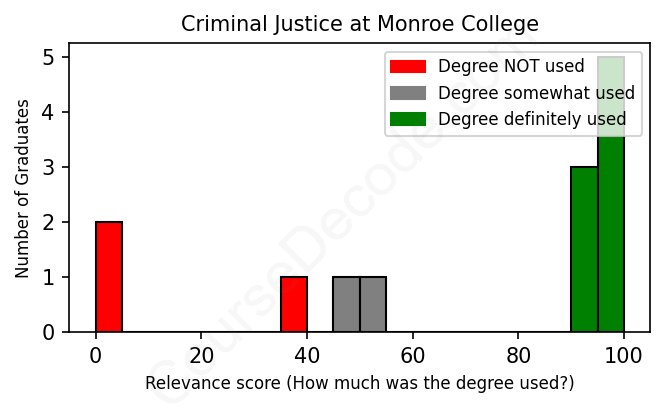
First, some facts. Of the Criminal Justice graduates from Monroe College we've analyzed , here's how many have used (or NOT used) their degree in their career:

These are estimates based on AI analysis of 13 LinkedIn profiles (see below).
The verdict? Slightly above average. Overall, with an average relevance score of 69%, Criminal Justice graduates from Monroe College have a slightly higher likelihood (+2%) of finding work in this field compared to the average graduate across all fields:
And for comparison, here's the chart for all profiles we've looked at across all degrees.
Also, after graduating, only 30% of these graduates have pursued further education other than another Bachelor's degree (such as a Masters degree or other), compared to the average across all profiles of 35%. This suggests a Bachelors degree is enough for most Criminal Justice graduates, and it's normal to look for work straight after graduation.
See the details:
|
Relevance score: 50% We think this person has gone into a career only somewhat relevant to their degree. We think this person has gone into a career only somewhat relevant to their degree.
DEGREE INFOGraduated in 2010 from Monroe College with a Bachelor of Applied Science (B.A.Sc.) in Criminal Justice. No other secondary education since. JOB HISTORY SINCE GRADUATIONCommunity Support Supervisor AHRC New York City Jan 2013 - Present ABOUTNo information provided. |
The top 10 most common jobs done by the graduates we've analyzed (ranked most common to least) are:
So, when looking at the types of jobs people with a Criminal Justice degree from Monroe College have landed, we see a mix of roles, but the most common ones seem to center around advocacy, legal assistance, and security. Many graduates have found positions like Victim Advocates or Youth Advocates, where they're directly helping individuals within the criminal justice system. You also have roles like Parole Officers and Home Confinement Case Managers, which are clearly tied to the core functions of Criminal Justice. Other common jobs include different types of legal assistants and paralegals, which do involve legal knowledge and support roles that are relevant to the field.
However, not all jobs this group has taken on are directly relevant to their degree. For example, numerous alumni have roles in customer service, administration, or other areas where Criminal Justice knowledge isn't particularly needed. While some of these positions might touch on related skills or understanding of social issues, they don't fully utilize the specialized training that comes from a Criminal Justice program. So, while many have found relevant and fulfilling careers, there's definitely a segment that has ventured into fields where their degree isn't being put to use.
Here is a visual representation of the most common words in job titles for Criminal Justice graduates (this is across all Criminal Justice graduates we've analyzed, not just those who went to Monroe College):

From analyzing the career trajectories of graduates from Monroe College's Criminal Justice program, it seems like a mixed bag in terms of job relevance and progression. Many of the graduates found their first jobs in positions that are somewhat related to their degrees, such as victim advocacy, legal assistance, and various community support roles. For example, individuals who graduated around 2010-2012 secured roles like Community Support Supervisor and Victim Advocate, which align well with the skills and knowledge gained from their Criminal Justice studies. However, some graduates also ventured into roles that might not be directly tied to Criminal Justice, like customer service or administrative positions, especially early on in their careers.
Looking further down the line, by the time these graduates hit the five or ten-year mark, many have carved out more defined paths within the Criminal Justice field. For instance, some have advanced to roles like Parole Officer or moved into legal support positions such as Litigation Paralegal. Others have transitioned into related fields, such as mental health services, which although not strictly Criminal Justice, often intersects with the legal system. This suggests that while the initial job outcomes aren't universally high-profile or directly linked to Criminal Justice, many people eventually find their way into relevant and impactful roles within that domain, indicating a degree of upward mobility and specialization over time. Overall, the journey seems to be one of gradual progression, where early jobs might not be ideal but lead to substantive careers down the road.
Honestly, a Bachelor’s degree in Criminal Justice, whether at Monroe College or anywhere else, can be a mix of challenging and manageable. It’s definitely not the easiest degree out there, but it’s also not the hardest. You'll dive into topics like criminology, law enforcement, and the justice system, which can be super interesting if you’re into that stuff. The workload is pretty standard for a college degree—there will be essays, projects, and exams, but if you stay organized and keep up with your readings, you should be fine. It helps to have a genuine interest in the subject; that makes a big difference in how challenging it feels. Overall, it's a solid program that strikes a balance, so if you're motivated, you’ll likely do well!
Most commonly, in the LinkedIn profiles we've looked at, it takes people 2 years to finish a Bachelor degree in Criminal Justice.
From what I can see, it looks like the Criminal Justice graduates from Monroe College have landed some pretty solid jobs, but the pay might not be as high as they hoped for considering the field. Many have taken roles that focus on community support, advocacy, and legal assistance, which can be fulfilling but often don’t pay that well, especially early in their careers. Positions like Community Support Supervisor, Customer Service Supervisor, and various caseworker roles—while essential—tend to offer modest salaries. However, some like the Parole Officer and Managers in criminal justice services may have better earning potential. Overall, it seems like they’re building good experience and skills, but the money might not be as flashy just yet.
Here is a visual representation of the most common words seen in the "about" section of LinkedIn profiles who have a Bachelor degree in Criminal Justice (this is across all Criminal Justice graduates we've analyzed, not just those who went to Monroe College). This may or may not be useful:

Here are all colleges offering a Bachelor degree in Criminal Justice (ordered by the average relevance score of their Criminal Justice graduates, best to worst) where we have analyzed at least 10 of their graduates: